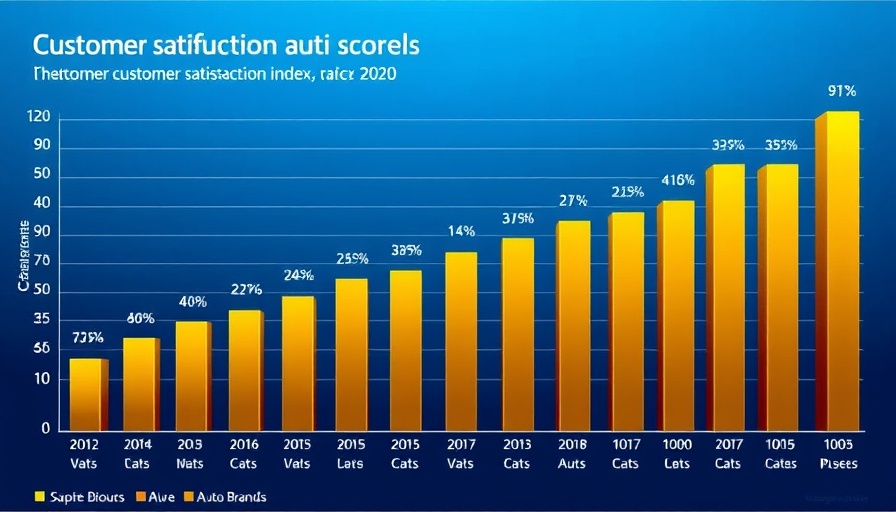
Electric Vehicle Service Satisfaction: A Stark Comparison
Despite the rising tide of electric vehicle (EV) ownership, a recent J.D. Power study reveals a concerning trend—customer satisfaction with electric vehicle service lags markedly behind gas vehicles. As dealerships adapt to an evolving market catering increasingly to electrified automobiles, challenges regarding customer service and extensively trained technicians present significant hurdles.
In 2024, overall satisfaction in dealership service departments reached impressive heights, climbing 12 points for premium brands and 14 for mass-market brands. However, EV and plug-in hybrid vehicle owners reported substantially lower satisfaction ratings—51 points less than their mass-market gas counterparts and 57 points lower in the premium sector.
Training Deficits: A Barrier to High Satisfaction
The gap in satisfaction can be attributed to a persistent shortage of trained technicians for electric vehicles, as noted by J.D. Power researchers. As the EV market expands, the skill sets required for servicing these vehicles are becoming increasingly specialized. Dealerships are finding that retaining and attracting adequately trained staff is vital to improve service ratings.
Moreover, many customers voiced frustrations about long wait times for appointments and inadequate communication throughout the service process. In fact, the study highlighted that the average wait time for an appointment has actually increased since 2022, compounding the dissatisfaction felt by EV owners.
Key Performance Indicators: The Importance of Communication
Strong communication is pivotal for enhancing customer satisfaction, and the findings show that key touchpoints significantly affect the overall service experience. For instance, dealerships managed to greet customers upon arrival only half of the time, showcasing a clear area for improvement. This gap reinforces the need for dealerships to focus on customer needs and maintain open lines of communication, especially in the context of service status updates and post-service satisfaction verification.
Including routine maintenance during recall service greatly enhances customer satisfaction as well, with a noticeable rise in ratings when maintenance tasks like oil changes are integrated with recall service checks. In the age of convenience, combining these services is a practical solution for busy customers.
Generational Trust and Retention Strategies
Interestingly, customer trust in dealers varies significantly across generations. Baby Boomers exhibit the highest level of trust compared to younger generations, such as Gen Z, which raises questions about how dealerships can forge stronger connections with a new, younger audience that is often more skeptical. Techniques like personalized service experiences and transparent communication could help bridge this generation gap.
The Road Ahead for Electric Vehicle Dealership Service
As the EV market continues to grow, customer loyalty will increasingly hinge on dealer service experiences. J.D. Power noted that while complimentary maintenance programs entice customers to return, actual customer-paid service depends on the satisfaction derived from their previous experiences. As manufacturers introduce more electrified models, dealership service departments must adapt to meet evolving consumer expectations, especially regarding service quality and convenience.
Comparatively, the effective strategies that lead to satisfied gas vehicle owners may not translate directly to the electric vehicle sector without significant adjustments. In 2025, established brands such as Porsche and Lexus set satisfaction benchmarks, highlighting the potential advantages of adopting high-quality service practices from top performers.
Embracing Change: A Call for Action
To thrive in this shifting automotive landscape, dealership owners and general managers must prioritize training for EV technicians, streamline service appointment processes, and focus on customer communication and engagement. As electric vehicles become increasingly prevalent, ensuring a seamless and satisfying service experience can turn first-time electric vehicle buyers into lifelong customers.
Ultimately, the study indicates a clear pathway for improvement. By addressing the training and service performance gaps, dealerships can leverage the growing EV market to solidify customer loyalty and enhance dealership success. Don't miss out on the opportunity to enhance your service department capabilities—invest in training and commit to excellent service today!
 Add Row
Add Row  Add
Add 

 Add Row
Add Row  Add Element
Add Element 




Write A Comment